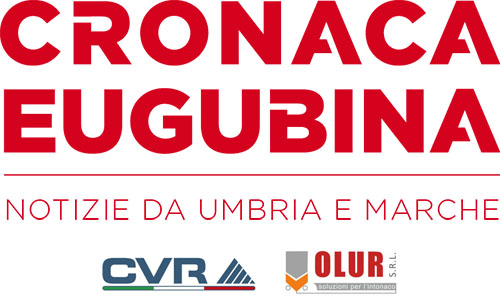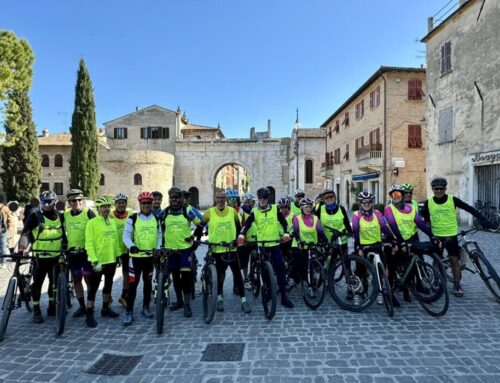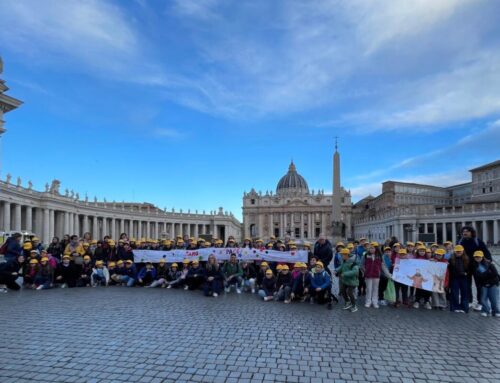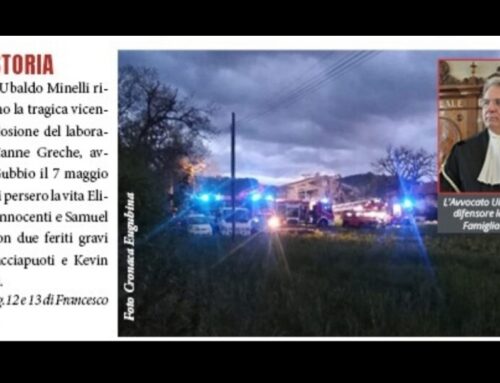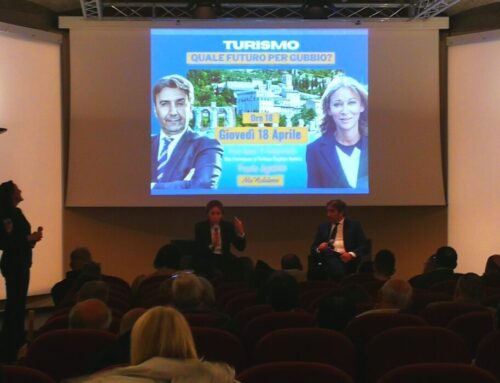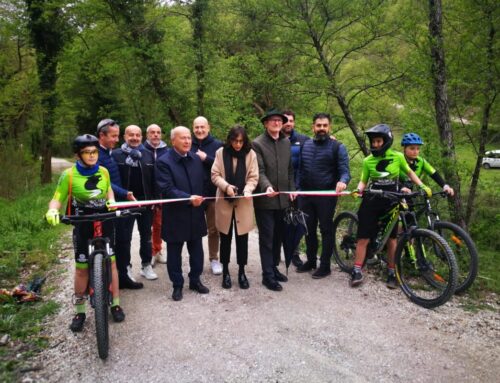L’assessore Alessia Tasso agli studenti: “È fondamentale tornare a parlare di questi temi nelle scuole, sperando di suscitare quella sensibilità che potrà portarvi a comportarvi correttamente anche in altri ambiti“
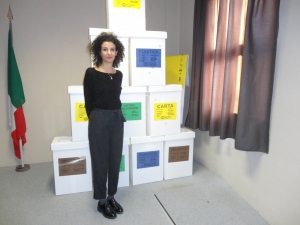
Alessia Tasso al Cassata
GUBBIO – Questa mattina (mercoledì 8 novembre) è stato presentato ai ragazzi “Porta a porta… a scuola”, un progetto di sensibilizzazione alla raccolta differenziata coordinato dall’IIS Cassata Gattapone con le sue referenti, la Prof.ssa Lucia Zoppis per il Cassata e la Prof.ssa Marisa Manuali per il Gattapone, in collaborazione con il Comune di Gubbio.
Il progetto, che coinvolgerà i 1.100 studenti dell’intero Istituto, prevederà, a partire da lunedì prossimo, l’utilizzo di appositi contenitori, suddivisi con delle etichette per le diverse tipologie di rifiuti da differenziare.
Gianni Menichetti, in rappresentanza del preside David Nadery, ha spiegato l’importanza di affrontare questo argomento anche in ambito scolastico: “La questione dei rifiuti è uno degli aspetti più rilevanti che un Comune deve affrontare, in quanto c’è di mezzo la nostra salute, la salubrità degli ambienti in cui viviamo, in cui lavoriamo, in cui facciamo scuola. La gestione dei rifiuti deve essere per forza un’attività di tipo formativo perché si tratta di un’attività che può funzionare. Ci abbiamo già provato negli anni scorsi, ma l’iniziativa non è stata gestita nel modo corretto e abbiamo dovuto interromperla. Oggi dobbiamo iniziare a comportarci responsabilmente”.
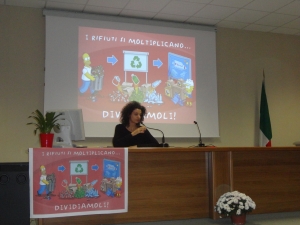
Alessia Tasso durante il convegno
L’assessore Alessia Tasso ha spiegato l’impatto che ha nella nostra città una buona o una cattiva raccolta differenziata: “È fondamentale tornare a parlare di questi temi nelle scuole, sperando di suscitare quella sensibilità che potrà portarvi a comportarvi correttamente anche in altri ambiti.
In media, ogni abitante, produce circa 488 kg di rifiuti all’anno. Nello specifico, a Gubbio, produciamo 16.000 tonnellate, dato che purtroppo rispetta la media italiana, di cui, nel 2015, la percentuale di raccolta differenziata è stata inferiore al 50 %.
Questo non è un bel dato, sotto l’aspetto ambientale dell’inquinamento e soprattutto economico: il costo della gestione dei rifiuti ricade direttamente sui cittadini, quindi più rifiuti indifferenziati abbiamo, più il costo aumenta in quanto lo smaltimento del rifiuto indifferenziato è la parte più onerosa della gestione dei rifiuti. Inoltre, non dobbiamo tralasciare il fatto che l’Unione Europea vuole chiudere tutte le discariche ed infligge una multa di più di 42 milioni per ogni sei mesi di ritardo nell’attuazione di questa direttiva.
La raccolta differenziata ed il riciclo dei rifiuti sono il nostro futuro poiché porta benefici dal punto di vista economico, ambientale poiché i rifiuti vengono venduti all’aziende che li trasformano in altro e per il risparmio delle risorse naturali. Per farvi un esempio, con 19.000 barattoli si può costruire un automobile, con 800 lattine una bicicletta e con 7 magliette di plastica una maglietta da calcio. Questo per farvi capire che anche le multinazionali si stanno convertendo verso la raccolta differenziata e l’utilizzo di materiali riciclati per diminuire l’impatto ambientale”.
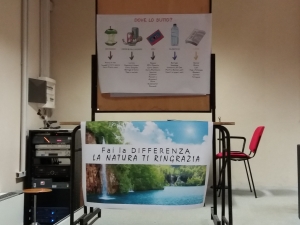
“Porta a porta a scuola”
Meeting about the project of separate collection of waste
This morning has been introduced to the boys “Porta a porta… a scuola“, a project of sensitization to the separate collection of waste coordinated by the IIS Cassata Gattapone with its professors, the Prof.ssa Lucia Zoppis for the Cassata and the Prof.ssa Marisa Manuali for the Gattapone, in collaboration with the Commune of Gubbio.
The project, that will involve the 1100 students of the whole Institute, will foresee, beginning from next Monday, the use of special containers, divided with some labels for the different typologies of refusals to differentiate.
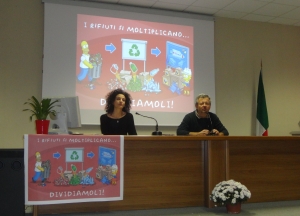
Alessia Tasso e Gianni Menichetti
Gianni Menichetti, in representation of the headmaster David Nadery, has expressed the importance to also face this matter in scholastic circle: “The matter of the waste is one of the most remarkable aspects that a Commune must face, because involve our health, the salubriousness of the environments in which we live, in which we work, in which we make school.
The management of the waste must be for strength an formative activity because it deals with an activity that can work. We have already tried it in the last years, but the initiative has not been managed in the correct way and we has had to interrupt it. Today we must begin to responsibly behave us“.

Alessia Tasso durante il convegno
The councillor Alessia Tasso has explained the impact that has in our city a good person or a bad separated collection: “It is fundamental to return to speak of these themes in the schools hoping to arouse that sensibility that can bring to also behave you correctly to you in other circles. In average, every inhabitant, produces around 488 kg of waste a year.
In the specific one, in Gubbio, we produce 16000 tons, since unfortunately respects the Italian average. In 2015, the percentage of separated collection has been inferior to 50%.
This is not a beautiful datum, under the environmental aspect of the pollution and above all under the economic: the cost of the management of the waste directly reverts on the citizens, therefore more undiversified refusals we have, more the cost increases, because the disposal of the undiversified waste is the most onerous part of the management of the waste. Besides we must not skip the fact that the European union wants to close all the dumps and inflicts a fine more of 42 million for every six months of delay in the realization of this directive.
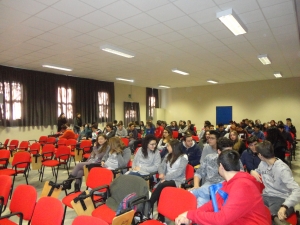
Gli studenti del Cassata
The separated collection and the recycle of waste are our future since hands benefits from the economic point of view, environmental since the waste are sold to the firms that transform them in other and for the saving of the natural resources.
To make you an example with 19000 jars an automobile can be built, with 800 cans a bicycle and with 7 plastic shirts a kick shirt. This is for making you understand that also the multinationals are converting toward the separated collection and the use of materials recycled for decreasing the environmental impact”.
Servizio di Ilaria Stirati – Fotografie Cronaca Eugubina

